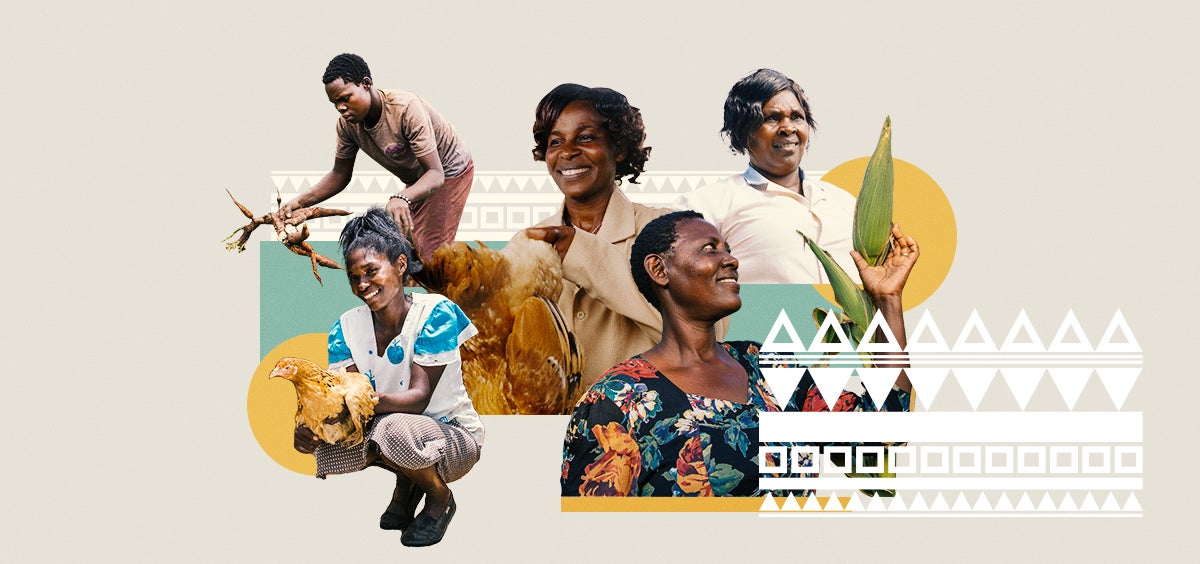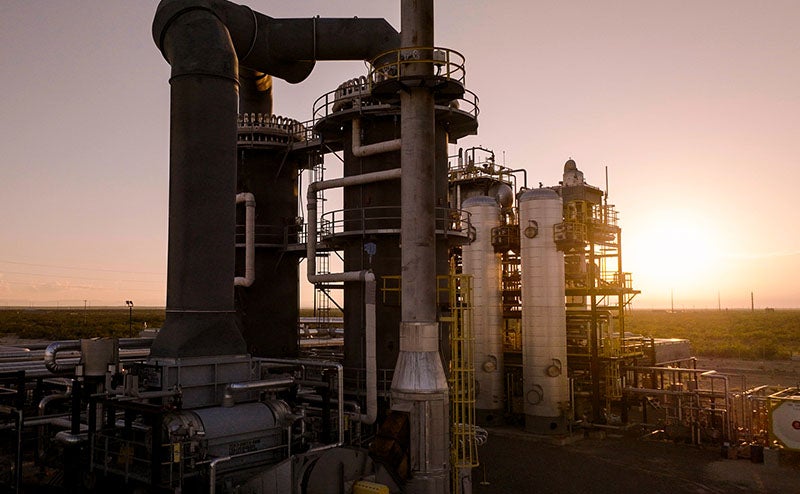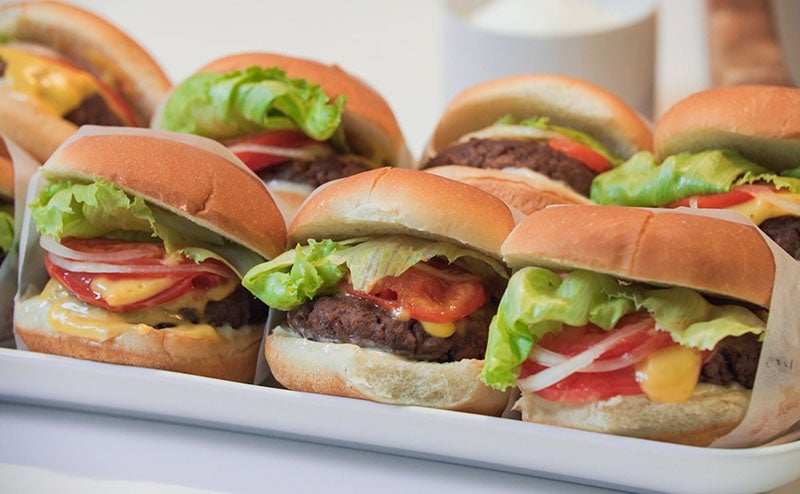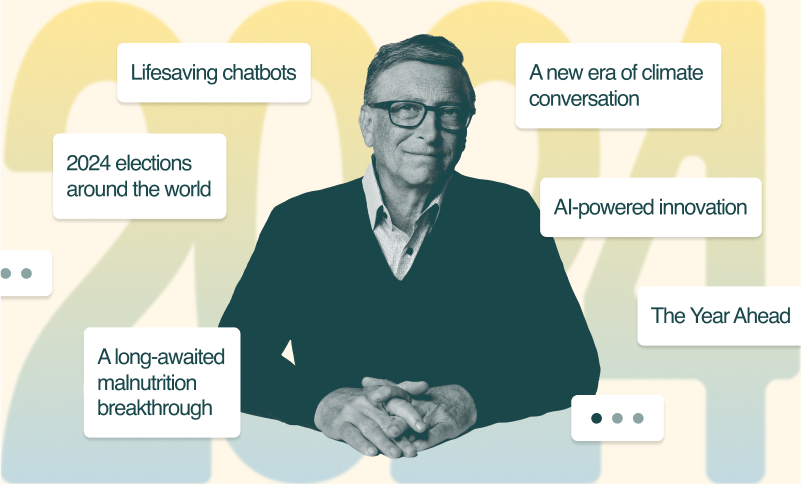Paul Farmer was a hero of mine, and I feel lucky to consider him a friend too.
I planted drought-tolerant seeds, fed and weighed chickens, and used a mobile phone to monitor weather forecasts and local crop prices.
These were a few of the chores I was given during my visit with Mary Mathuli, a smallholder farmer in rural Kenya.
I stopped at her home in Makueni County, south-east of Nairobi, during my recent trip to Kenya to better understand how farmers like Mary are faring in the face of climate change.
I arrived expecting to hear her talk about the record droughts and smaller harvests many farmers are experiencing throughout Africa.
Instead, to my surprise, she led me out to her fields to show off the innovations that are allowing her to continue to grow crops and earn an income to support her family, despite the drastic changes in rainfall and weather patterns.
A natural teacher, Mary encouraged me to learn by doing. She put me to work so I could understand how these new agricultural inputs and practices can make a big difference in their lives.
This experience taught me a couple important lessons.
First, my farming skills—like holding a chicken and swinging a hoe—need some work.
Second, and more importantly, I got a personal reminder of how resourceful and resilient African smallholder farmers like Mary are. Battered by years of drought and other extreme weather patterns, they are developing new skills and embracing new technologies to adapt to some of the toughest conditions for growing crops and raising livestock.
To be clear, African farmers face huge challenges due to climate change. Although sub-Saharan Africa accounts for only about four percent of the world’s carbon emissions, the continent is bearing the brunt of climate change impacts. Climate-related losses on many African farms are more than double those seen globally. In Makueni County, where Mary farms, yields of maize have been falling since 1994, largely due to changes in the weather.
While more innovation is needed to help Africa’s smallholder farmers keep pace with the threats posed by climate change, Mary and other farmers in Kenya are adopting some incredible new tools and practices that can limit crop losses and help their farms thrive even in extreme weather:
Chickens: Our first stop at Mary’s farm was her chicken coop, where she promptly handed me a large hen to hold. Chickens serve as a kind of hedge against climate risks because they can provide a reliable source of income, even in times of extreme weather. She sells eggs and the adult chickens for meat at her local market. She also sells chicks to other farmers so they can raise their own flocks. What’s more, chickens (both the eggs and the meat) provide valuable nutrition to families, especially important for children.
But, she added, adult chickens can only be sold when they weigh about 1.5 kilograms, a measurement that is made by instinct and not on a scale. She asked me to judge the weight of the chicken in my hands. I had a guess that it felt ready to go to market. Fortunately, I was right.
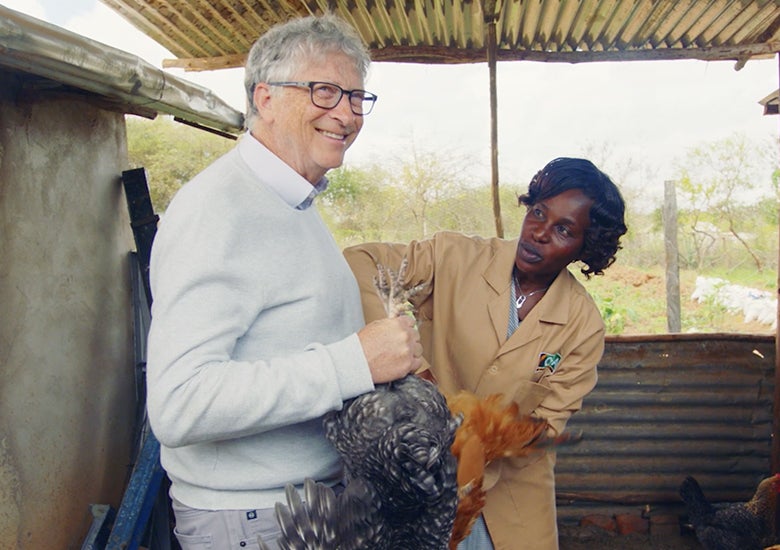
Chickens serve as a kind of hedge against climate risk for many farmers like Mary. They’re a valuable source of income and nutrition for families in Kenya regardless of extreme weather.
Drought-tolerant seeds: Next, we walked out to Mary’s fields, where she handed me bags of improved seeds that can handle extreme weather conditions. Some of the most successful varieties have been developed by researchers at the International Maize and Wheat Improvement Center, an amazing organization that’s part of a global partnership called CGIAR that focuses on improving food security. Other drought-tolerant varieties have been developed by local partners like the Kenya Agriculture and Livestock Research Organization (KALRO), whom I also had the pleasure of visiting in Nairobi.
Mary uses drought-tolerant maize seeds and bean seeds, which she invited me to plant with her. I helped her dig a square planting pit, about a foot deep, which conserves rainwater. Then we dropped in the seeds, covered them with soil, watered them, and added a thin layer of straw on top to help provide some protection from the heat.
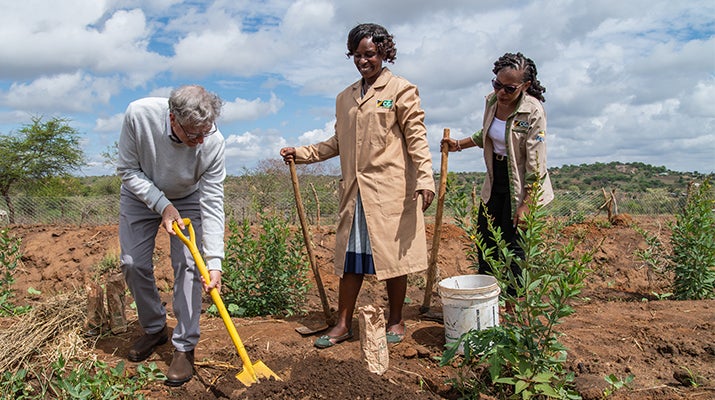
Mary taught me how to plant seeds in a way that conserves water.
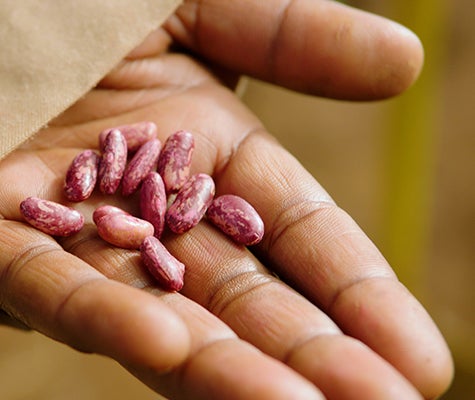
Drought-tolerant seeds help farmers ensure the performance of their crops in the face of changing climate conditions.
Mary taught me how to plant seeds in a way that conserves water.
Drought-tolerant seeds help farmers ensure the performance of their crops in the face of changing climate conditions.
Mobile phones: Asked about other innovations that have helped her, Mary pulled out her mobile phone. It’s an important tool for farmers to raise their productivity and increase their incomes through access to vital agriculture information and services. She directed me to an app on her phone where I could check the local weather. While local weather forecasts are common throughout much of the world, in rural Kenya and other remote parts of Africa, getting this vital information is sometimes difficult. Farmers can also use their phone to check market prices for crops and livestock, get knowledge and technical support to improve farm operations, and access financial services and insurance.
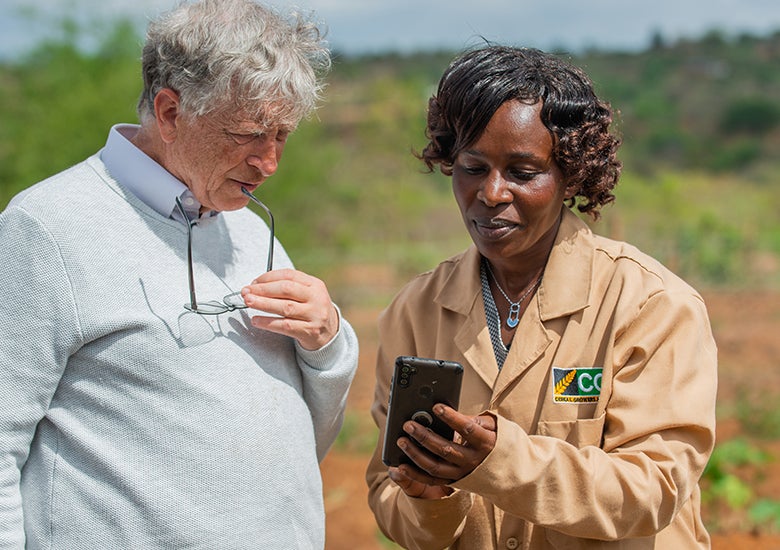
I was interested to learn how important mobile phones were to the success of farmers. Mary, like many farmers, uses her phone to check the weather, market prices for crops, and more.
As farms go, Mary’s farm is quite small. Just about 4 acres, which is typical for farms in Africa. Still, she packs a lot of activities in this space, growing commercial and subsistence food crops and rearing poultry and livestock. In sub-Saharan Africa, more than half of the population works in agriculture. Together, they produce about 80 percent of the continent’s food supply. And most of the people doing the backbreaking farm work—like the chores I performed—are women.
I was impressed by Mary’s entrepreneurial spirit and her optimism. She appeared to seize every opportunity to try out new technologies and agricultural practices. It’s one of the reasons why she was trained as a model farmer and Village Based Advisor by the Cereal Growers Association, an organization that works with smallholder farmers to help improve their productivity. In this role, Mary provides guidance to several hundred farmers in her community, showing them how to use drought-tolerant seeds, raise chickens, and adopt other climate adaptation agricultural strategies.
She is clearly doing a good job in this role because more than 90 percent of farmers in her area have embraced one of the new adaptation practices.
I look forward to hearing how the seeds I planted with Mary are doing, despite the disappointing rains in recent months. I can’t imagine them in better hands than hers.
Thanks so much for the visit, Mary!
